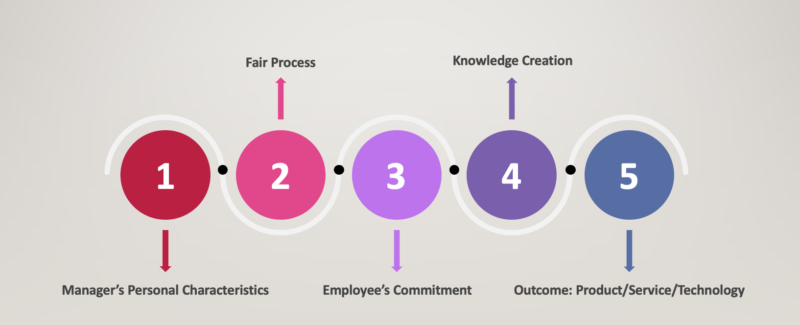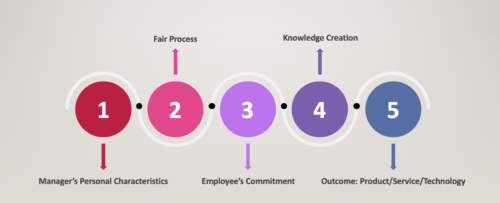
21 Dec What do Good Managers do?
The pandemic has forced organisations world-wide to re-think their people management strategies. Most of their workforce is now working from home and managing through fear and surveillance is no longer working. I would go far as to say this management style has long been ineffective. In a world where new products are being rolled out on a daily basis, where innovation is key and knowledge is the new oil, what makes a manager effective? What characteristics make for a good people manager?
Managing people in a knowledge-based economy
In most organisations today, a business’ main asset is the knowledge and expertise of their employees. Employees are the company’s means of production and the most important resource of a business. People are key to an organisation gaining a competitive advantage and this is what makes people management more important than ever.
Many organisations measure a manager’s worth by their ability to achieve good results. This makes a manager’s value directly proportional to them and their teams reaching company-set targets. Organisations have long assessed an employee’s performance by measuring the fulfilment of repetitive tasks or by the ability to generate a specific output. However as we move on to a knowledge-based economy, employees are no longer seen as information-processing machines. Efficiency and lower costs are not the equivalent of success. Creating a product or providing a service that creates competitive advantage is what brings sustainable value. In this type of economy a good manager inspires a commitment from employees that motivates them to create knowledge.
The process of achieving such commitment is referred to as “the fair process” and it is key to effective management.
Why manage through a fair process?
People care about why outcomes were reached and are driven by a commitment towards those outcomes. Employees will co-operate and go the extra mile, if they are committed to an outcome. They share their knowledge and use their creativity to create company value, if they believe in what they are doing. A manager that inspires such a drive in employees, is a manager that inspires the creation of exceptional knowledge. An effective manager has the behavioural competencies and the personal characteristics needed to inspire knowledge creation.
Competencies of a good manager
When an employee, a person, believes that the process followed to reach a decision was fair they are more likely to support it. Understanding the reasons behind a decision, inspires commitment towards the decision.
- As a good manager following fair process, you are able to influence attitudes and behaviours that are critical to high performance. You inspire a kind of commitment from employees that is unaffected by their opinion on the managerial decisions made.
- As a good manager, you are transparent and fair in you choices and decisions. You are able to make the “why” in your argument clear and evident. Whilst not everyone might agree with the “what” and the “how”, knowing that the “why” behind your choice was fair helps acquire people’s commitment.
- You take the time to explain why you have decided to go with a selected strategy. You explain the objective and the context of a project or a task, giving your team the tools needed to execute your decision. You respect your employee’ opinion and you respect their time, time they will spend executing your choices.
An employee that understands the objective and context of a project or task, can better decide what is needed to deliver. When an employee is allowed to decide on the details of delivering a task, they can better own the execution of the project and commit to it like it was their own. They personally commit to delivering value and reaching the set targets.
- As a good manager you are able to inspire personal commitment from their people. You are able to build an environment of trust, to make your team feel comfortable and to believe in the process taken to achieve the outcome. Your people are engaged and give their input during the decision-making process.
- You are able to inspire a commitment even from employees that do not necessarily agree with your choices, but they get behind them anyway because they understand the reason why something occurred. A good manager takes the time to do this, because they prioritise mutual trust and respect with their people. They lead through empathy.
- Finally, you are able to articulate clearly the responsibilities that come with the decision made. They should be able to accurately and clearly depict the importance behind following the set targets.
The importance of a good manager
It is a manager’s personal characteristics that allow for the smooth implementation of a fair process. This is why organisations should emphasise the importance of the behavioural competencies of a manager. A manager’s personal characteristics play an important deterministic factor in a company’s success. A good manager is able to inspire employees’ personal commitment and enables them to create the best knowledge that they can create. Good managers are the driving force of successful organisations in the knowledge era. Investing in managers that are strong enough to make a decision, knowledgable enough to clearly communicate it and empathetic enough to get their team behind it should be a top priority for any organisation that seeks sustainable and scaleable success in this knowledge driven economy.

Figure 1: Good Management
The process of acquiring your employees’ trust and commitment might seem lengthy and less important than profit. It is however becoming the only way of being a good manager and moreover an inspiring leader.

No Comments